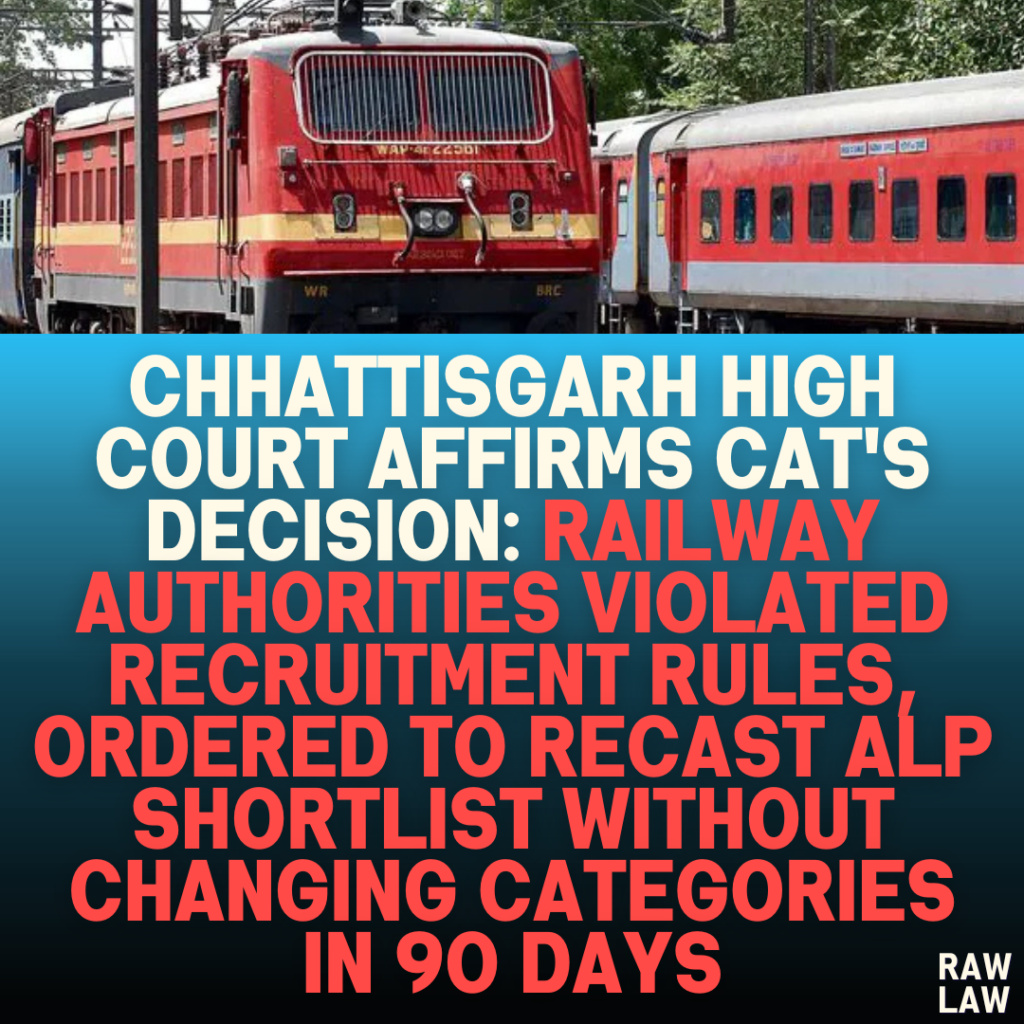Court’s Decision: The Chhattisgarh High Court dismissed the petitions filed by the Railway authorities and upheld the Central Administrative Tribunal’s (CAT) order. The court directed the railway authorities to comply with CAT’s order to recast the list of shortlisted candidates for the post of Assistant Loco Pilot (ALP) without changing categories, within 90 days from the receipt of the certified copy.
Facts: The dispute arose from the recruitment process for the post of Assistant Loco Pilot (ALP), as advertised by the Railway Recruitment Board through Notification No. 1/2018. The recruitment was conducted in two stages: a Computer-Based Test (CBT) followed by a Computer-Based Aptitude Test (CBAT). After the tests, the Railway authorities shortlisted candidates based on merit and verified their documents.
However, some candidates were dissatisfied with the process, claiming that reserved category candidates were switched between reserved and unreserved categories at different stages, thereby denying meritorious candidates from the unreserved category their rightful place. They filed petitions before the CAT, which directed the Railway authorities to recast the list without changing the categories.
Issues:
- Whether the switching of reserved category candidates between reserved and unreserved lists during different stages of the recruitment process was justified.
- Whether the recasting of the shortlist of candidates for the ALP post without changing categories was necessary.
Petitioner’s Arguments: The petitioners, represented by the Railway authorities, argued that the recruitment process followed proper procedures. They contended that the CAT had wrongly interfered with the process and that there was no illegality or irregularity in their actions. The petitioners also cited previous Supreme Court rulings, such as Saurav Yadav v. State of Uttar Pradesh, to support their argument that the recruitment was in line with established legal principles.
Respondent’s Arguments: The respondents argued that the Railway authorities had committed gross illegality by switching reserved category candidates between unreserved and reserved categories during the recruitment stages. They contended that this arbitrary action denied rightful candidates from the unreserved category their selection and created a backlog of vacancies in the reserved categories. They also relied on precedents like Deepa E.V. v. Union of India to assert that reserved category candidates who avail of any relaxation should not be considered in the unreserved list.
Analysis of the Law: The court carefully analyzed the legal principles governing the switching of reserved category candidates between different lists. It referred to previous judgments, including Deepa E.V. v. Union of India and Saurav Yadav v. State of Uttar Pradesh, which clearly state that candidates from reserved categories cannot be adjusted in the unreserved category if they have taken advantage of any relaxation.
Precedent Analysis: The court reiterated the precedent set in Deepa E.V. v. Union of India, where the Supreme Court held that reserved category candidates cannot claim positions in the unreserved category if they have availed of any relaxation during the recruitment process. This principle has been consistently applied in various judgments, including Gaurav Pradhan v. State of Rajasthan, and formed the basis of the court’s reasoning.
Court’s Reasoning: The court found that the Railway authorities had indeed violated their own recruitment rules by allowing reserved category candidates to switch between categories. The CAT’s order to recast the list without changing categories was deemed valid and in accordance with legal precedents. The court also found no merit in the petitioners’ argument that the CAT had unjustly interfered in the recruitment process.
Conclusion: The court concluded that the CAT’s order directing the recasting of the shortlist for the ALP posts was legally sound. It dismissed the Railway authorities’ petitions and ordered them to comply with CAT’s direction to recast the shortlist within 90 days.
Implications: This judgment reinforces the principle that reserved category candidates cannot be shifted to the unreserved category if they have availed of any relaxations. It underscores the need for transparency and fairness in the recruitment process, ensuring that merit is upheld while respecting the rules of reservation.




Pingback: Bombay High Court Denies Anticipatory Bail to Married Man, Holds Minor’s Consent Irrelevant Under POCSO Act: "Marital Discord Does Not Justify Actions Involving a Minor" - Raw Law